The Meiji Restoration. Do Now: Explain how these



























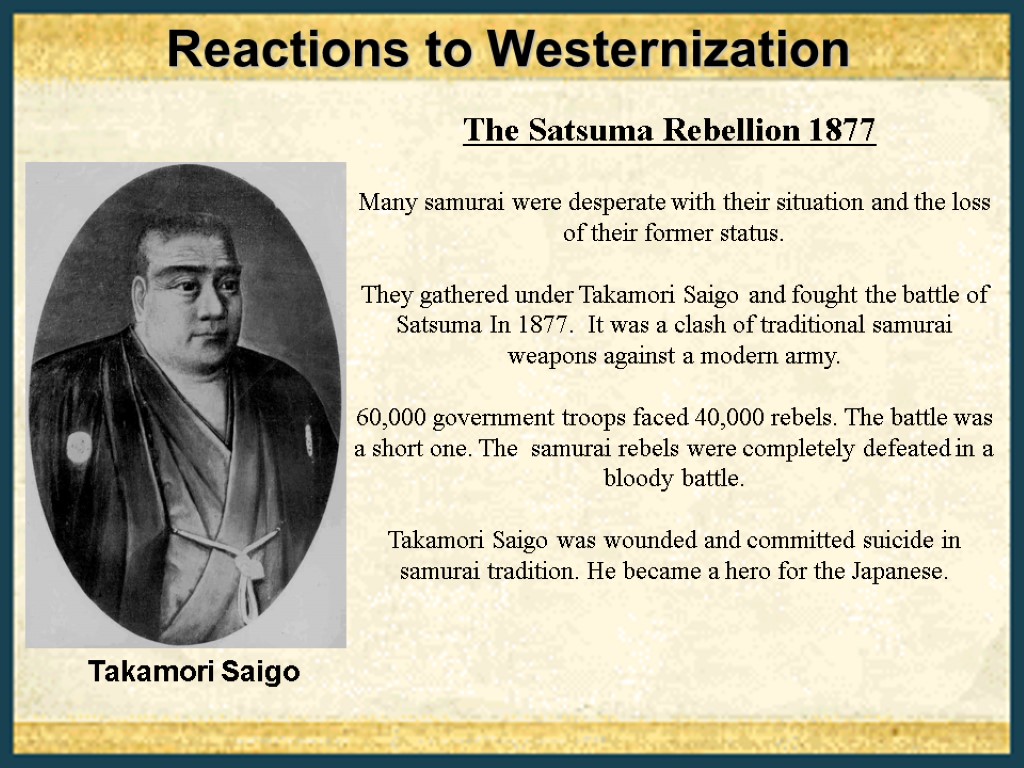
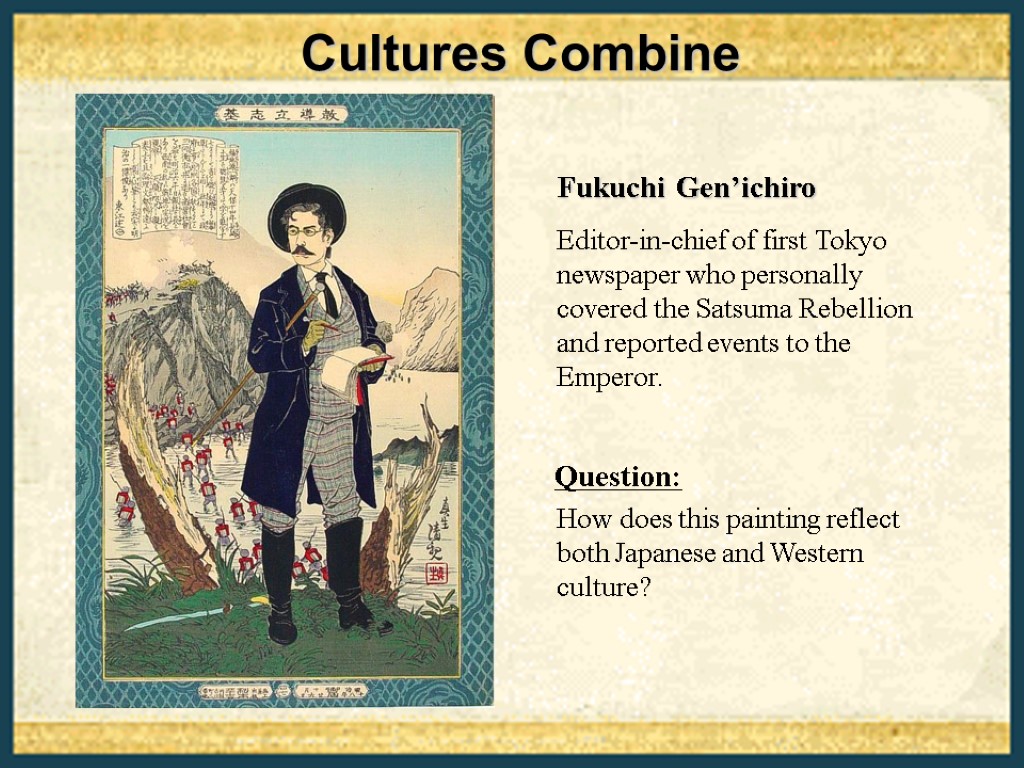
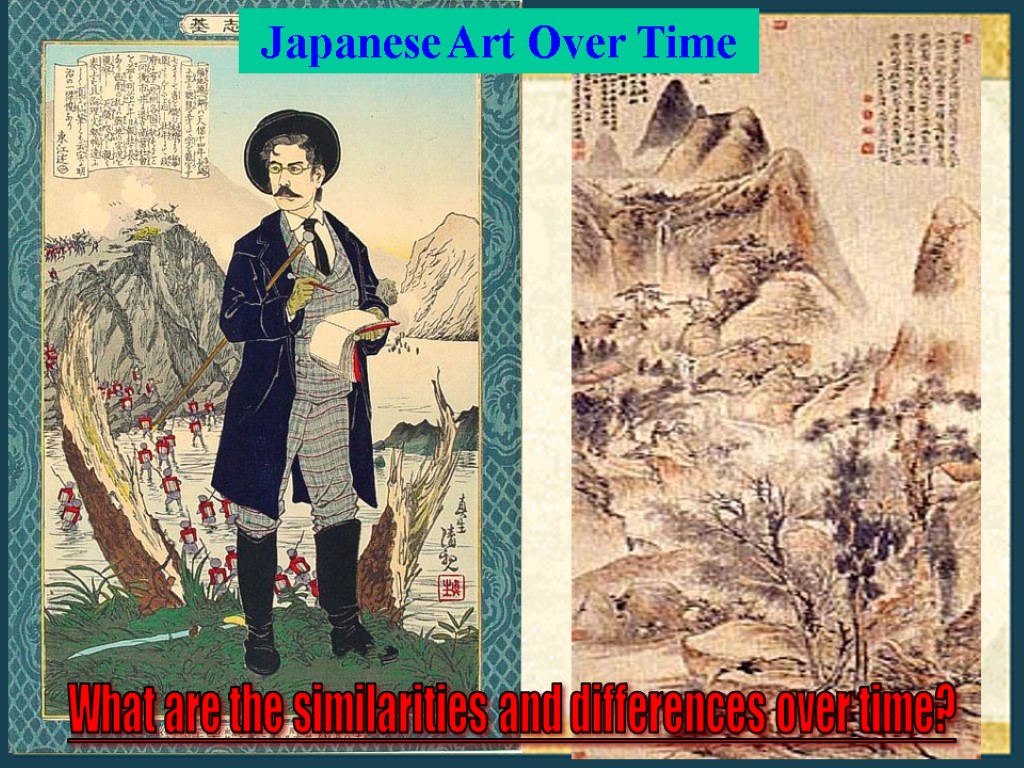
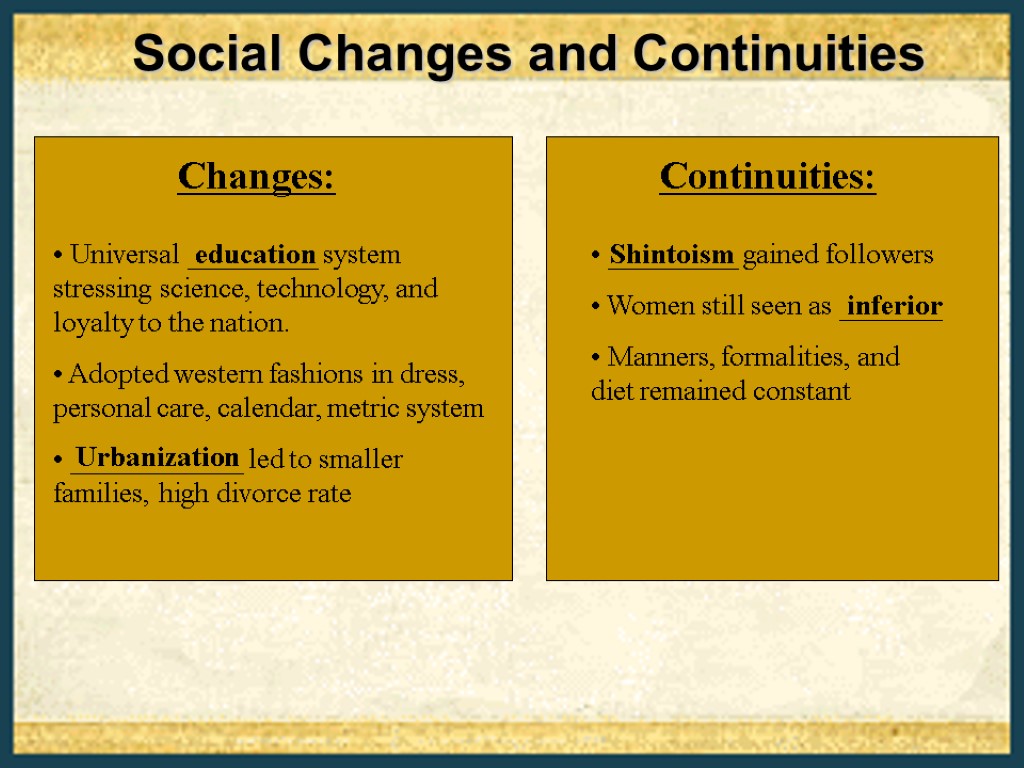
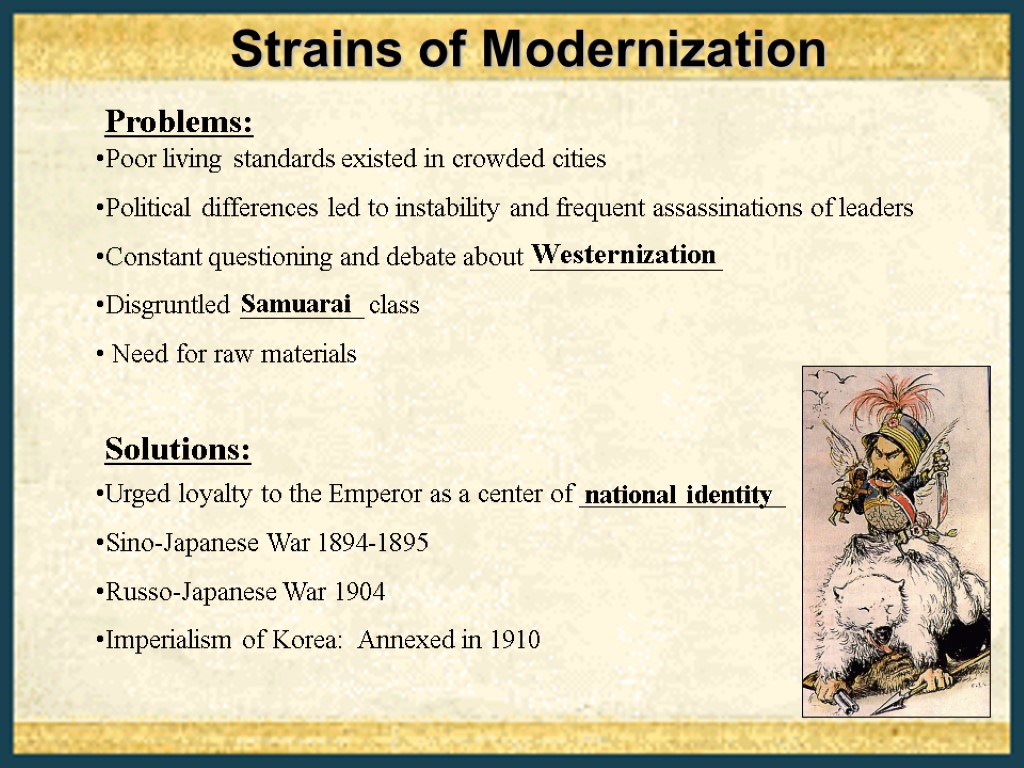
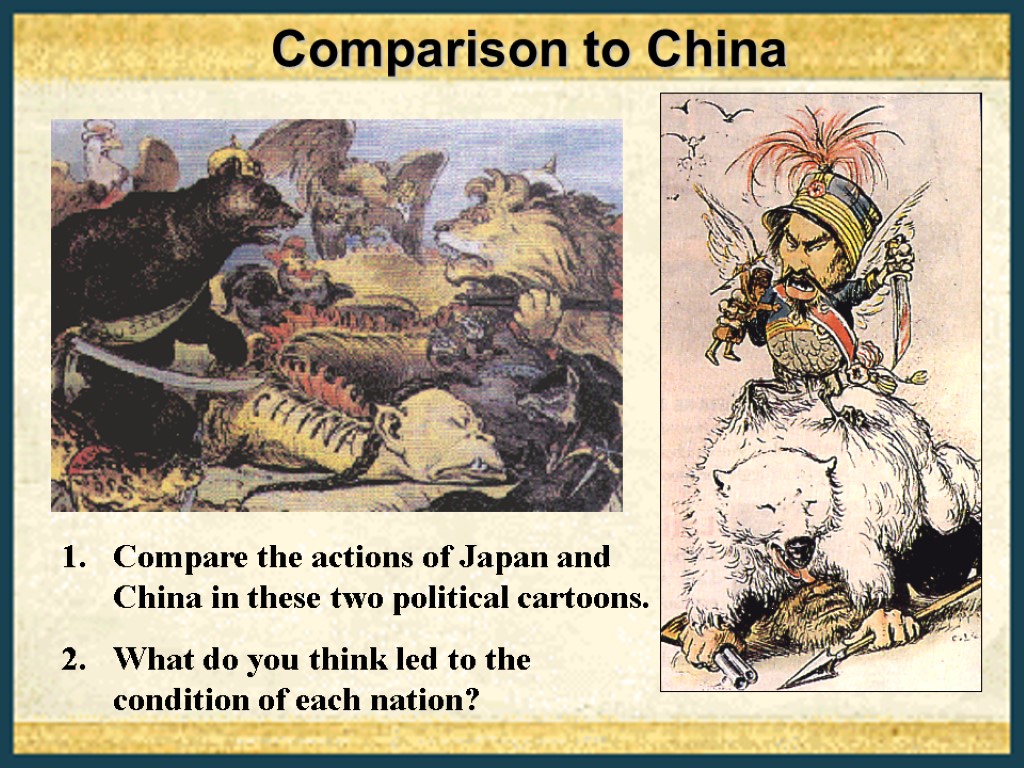
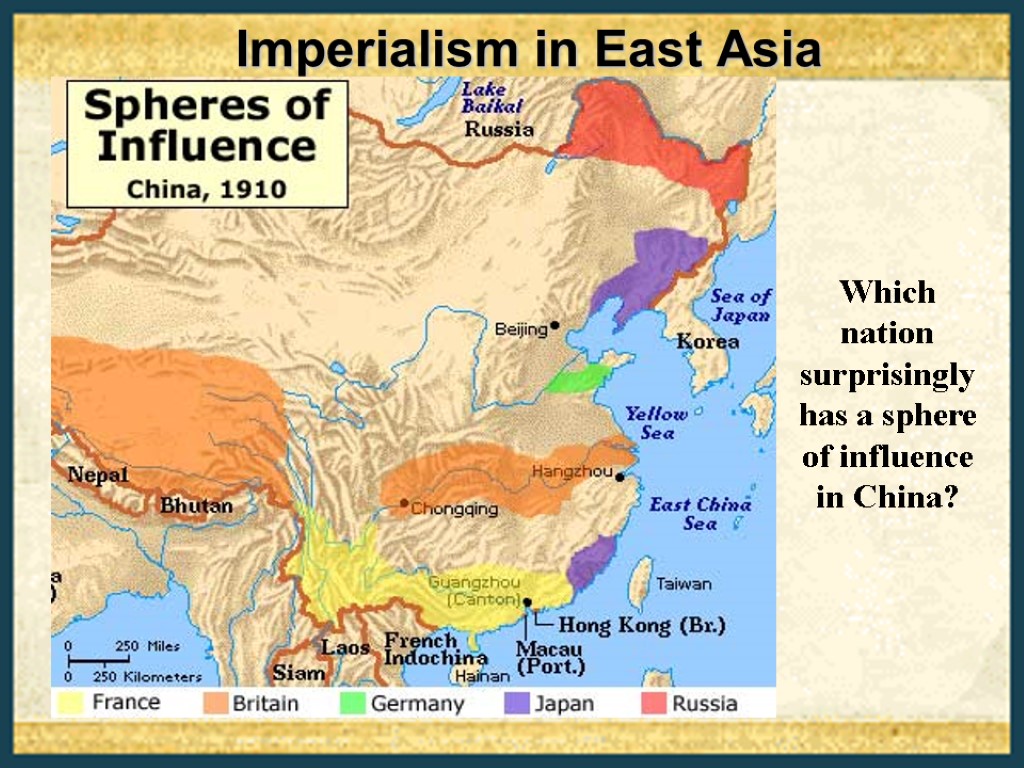
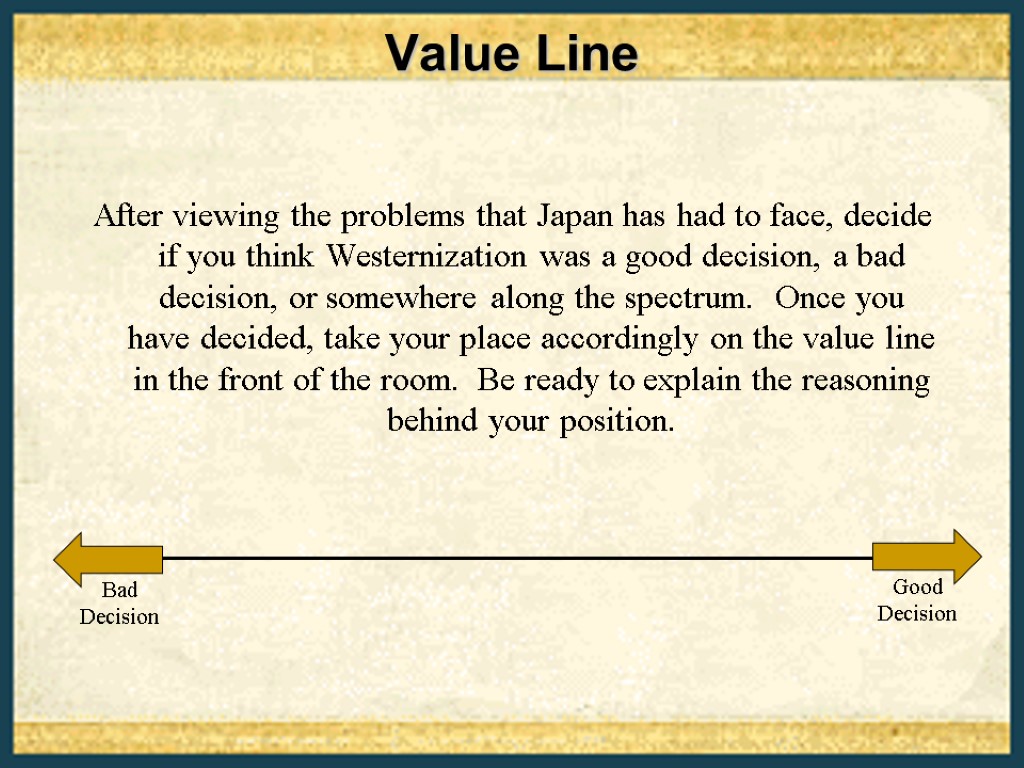
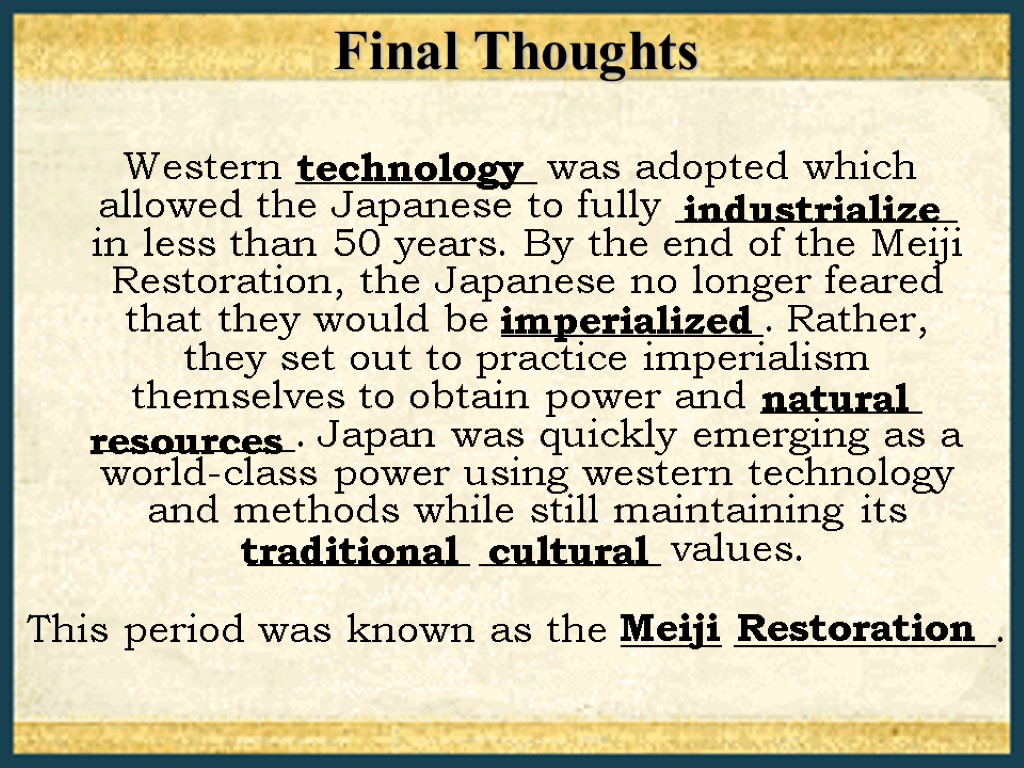

meiji_restoration_version.ppt
- Количество слайдов: 36
 The Meiji Restoration
The Meiji Restoration
 Do Now: Explain how these images show a change in Japanese society. Figure A Figure B AIM: To understand the transition from feudal to modern Japan. Photograph Interpretation / Compare and Contrast
Do Now: Explain how these images show a change in Japanese society. Figure A Figure B AIM: To understand the transition from feudal to modern Japan. Photograph Interpretation / Compare and Contrast
 Early Attitudes Toward Foreigners Directions: 1. Listen for your assigned role to follow. 2. Analyze the video clip from Shogun. 3a. Using 6 words (no more, no less), explain how the Japanese viewed the British. 3b. Using 6 words (no more, no less), explain how the British viewed the Japanese. 4. Be prepared to share your answers with the class. ________ ________ ________ ________ ________ ________ British thought the Japanese were uncivilized. Japanese thought the British were barbarians. ________ ________ ________ ________ ________ ________
Early Attitudes Toward Foreigners Directions: 1. Listen for your assigned role to follow. 2. Analyze the video clip from Shogun. 3a. Using 6 words (no more, no less), explain how the Japanese viewed the British. 3b. Using 6 words (no more, no less), explain how the British viewed the Japanese. 4. Be prepared to share your answers with the class. ________ ________ ________ ________ ________ ________ British thought the Japanese were uncivilized. Japanese thought the British were barbarians. ________ ________ ________ ________ ________ ________
 Can’t We All Just Get Along? Based upon what we have just discussed, is it possible for these two regions to establish positive relations with one another? If yes, list the steps that need to be taken to reach that goal. If no, list the reasons why it will never happen.
Can’t We All Just Get Along? Based upon what we have just discussed, is it possible for these two regions to establish positive relations with one another? If yes, list the steps that need to be taken to reach that goal. If no, list the reasons why it will never happen.
 In Japan, it is believed that the numbers four and nine are ominous. Shi – means four but it also means death. Ku – means nine but it also means suffering.
In Japan, it is believed that the numbers four and nine are ominous. Shi – means four but it also means death. Ku – means nine but it also means suffering.
 Let’s Go Back In Time… Tokugawa Period (1600-1868) Himeji Castle: Built in 1600s ___________________ Ruled by Shogun Capital City of Edo (Tokyo) Rigid Social Structure Belief Systems Shintoism - Zen Buddhism - Prohibited Christianity Centralized feudalism
Let’s Go Back In Time… Tokugawa Period (1600-1868) Himeji Castle: Built in 1600s ___________________ Ruled by Shogun Capital City of Edo (Tokyo) Rigid Social Structure Belief Systems Shintoism - Zen Buddhism - Prohibited Christianity Centralized feudalism
 Review Of Japanese Social Structure CHOICES: Samurai, Shogun, Farmers, Merchants, Daimyo, Artisans, Emperor Emperor Shogun Daimyo Farmers Artisans Merchants Back to Feudal Japan Back to “If not Shogun” Samurai
Review Of Japanese Social Structure CHOICES: Samurai, Shogun, Farmers, Merchants, Daimyo, Artisans, Emperor Emperor Shogun Daimyo Farmers Artisans Merchants Back to Feudal Japan Back to “If not Shogun” Samurai
 What geographic features enabled Japan to pursue a policy of isolationism? What are some positives and negatives of the geography of Japan? Geography of Japan
What geographic features enabled Japan to pursue a policy of isolationism? What are some positives and negatives of the geography of Japan? Geography of Japan
 1853: _____________ Makes “Friends” with Japan In July, 1853 Perry presented the Japanese Emperor with a proposed commercial and friendship treaty. He would return a year later to receive their answer. Matthew Perry
1853: _____________ Makes “Friends” with Japan In July, 1853 Perry presented the Japanese Emperor with a proposed commercial and friendship treaty. He would return a year later to receive their answer. Matthew Perry
 The year is 1853. You are the Tokugawa Shogun of Japan. A letter has just arrived from U.S. President Millard Fillmore. Read what he has proposed and decide how you will respond. Then, answer the questions attached.
The year is 1853. You are the Tokugawa Shogun of Japan. A letter has just arrived from U.S. President Millard Fillmore. Read what he has proposed and decide how you will respond. Then, answer the questions attached.
 Perry returned in 1854. This time he appeared with seven ships - four sailing ships, three steamers – and 1600 men. The Black Ships! Here’s The Real Deal
Perry returned in 1854. This time he appeared with seven ships - four sailing ships, three steamers – and 1600 men. The Black Ships! Here’s The Real Deal
 Result: The signing of this treaty signaled the end of Japanese ________. What was the Outcome of Perry’s Visit? In 1854 the __________________ ( ) was signed which established: 1. "permanent" friendship between the two countries; 2. proper treatment for shipwrecked Americans; 3. fuel for American ships; 4. two ports opened for trade. Treaty of Kanagawa isolation Does this treaty sound familiar?
Result: The signing of this treaty signaled the end of Japanese ________. What was the Outcome of Perry’s Visit? In 1854 the __________________ ( ) was signed which established: 1. "permanent" friendship between the two countries; 2. proper treatment for shipwrecked Americans; 3. fuel for American ships; 4. two ports opened for trade. Treaty of Kanagawa isolation Does this treaty sound familiar?
 Fall of Tokugawa Shogunate The Last Shogun, Tokugawa Yoshinobu Reasons for the fall: Samurai upset at “surrendering” to Westerners. Treaty of Kanagawa viewed as unfavorable to the Japanese. Tokugawa Shogunate seen as weak for ending 250 years of isolation. Some Daimyo saw this as an opportunity to change the social structure.
Fall of Tokugawa Shogunate The Last Shogun, Tokugawa Yoshinobu Reasons for the fall: Samurai upset at “surrendering” to Westerners. Treaty of Kanagawa viewed as unfavorable to the Japanese. Tokugawa Shogunate seen as weak for ending 250 years of isolation. Some Daimyo saw this as an opportunity to change the social structure.
 TASK: Before we continue on, you must rank the main causes of the fall of the Tokugawa Shogunate. Starting with #1 being the most important cause, rank the reasons accordingly. Be sure to explain why you chose the order.
TASK: Before we continue on, you must rank the main causes of the fall of the Tokugawa Shogunate. Starting with #1 being the most important cause, rank the reasons accordingly. Be sure to explain why you chose the order.
 Students in Japan clean the schools everyday. They begin doing this in first grade and it continues throughout high school.
Students in Japan clean the schools everyday. They begin doing this in first grade and it continues throughout high school.
 Emperor Mutsuhito, Meiji. If Not The Shogun, Then Who? The presence of the West triggered nationalist unrest. Who will most of the people in Japan turn to for leadership? Why? People of all classes appealed to the ________ for support. They used the slogan sonno joi “Revere the ________, expel the barbarians.” TASK: Create Your Own Slogan Imagine you are living in Japan and are upset with the decisions of the Tokugawa Shogunate. Create a protest sign, banner, bumper sticker, or T-shirt with a slogan that expresses your opinion. Need a hint? Let’s look back at the traditional social structure in Japan. emperor emperor
Emperor Mutsuhito, Meiji. If Not The Shogun, Then Who? The presence of the West triggered nationalist unrest. Who will most of the people in Japan turn to for leadership? Why? People of all classes appealed to the ________ for support. They used the slogan sonno joi “Revere the ________, expel the barbarians.” TASK: Create Your Own Slogan Imagine you are living in Japan and are upset with the decisions of the Tokugawa Shogunate. Create a protest sign, banner, bumper sticker, or T-shirt with a slogan that expresses your opinion. Need a hint? Let’s look back at the traditional social structure in Japan. emperor emperor
 Compare These Two Figures 1. What are the similarities and differences between the two men? 2. What adjectives would you use to describe each ruler? Traditional clothing, hair, sword, looks proud Looks like… Western clothing, hair sword, looks proud Looks like… Do Now:
Compare These Two Figures 1. What are the similarities and differences between the two men? 2. What adjectives would you use to describe each ruler? Traditional clothing, hair, sword, looks proud Looks like… Western clothing, hair sword, looks proud Looks like… Do Now:
 Emergence of the Emperor Over the next generation the whole society and its institutions were transformed to serve the needs of _____________. The Shogunate was defeated and a new emperor named __________was proclaimed. Emperor Mutsuhito, Meiji. This period is known as the _______________ – Meiji meaning ______________. Mutsuhito Meiji Restoration enlightened rule modernization
Emergence of the Emperor Over the next generation the whole society and its institutions were transformed to serve the needs of _____________. The Shogunate was defeated and a new emperor named __________was proclaimed. Emperor Mutsuhito, Meiji. This period is known as the _______________ – Meiji meaning ______________. Mutsuhito Meiji Restoration enlightened rule modernization
 Why Modernize? Based on these images, what factors caused the Japanese to modernize? Perry’s Black Ships What was this policy called? CHINA USA GERMANY RUSSIA GREAT BRITAIN FRANCE JAPAN ITALY
Why Modernize? Based on these images, what factors caused the Japanese to modernize? Perry’s Black Ships What was this policy called? CHINA USA GERMANY RUSSIA GREAT BRITAIN FRANCE JAPAN ITALY
 Emperor promises to institute political and social reforms and work to strengthen the nation. Changes During The Meiji Restoration Abolished feudalism Eliminated samurai armies Reformed education Created a centralized gov’t and encouraged loyalty to the emperor Created Japan's first Western-style constitution (1889), followed the next year by the country's first elected Diet. Adopted Western technology Opened up trade (ended isolation) Fukoku Kyohei: “Enrich the country and strengthen the military” Major Changes:
Emperor promises to institute political and social reforms and work to strengthen the nation. Changes During The Meiji Restoration Abolished feudalism Eliminated samurai armies Reformed education Created a centralized gov’t and encouraged loyalty to the emperor Created Japan's first Western-style constitution (1889), followed the next year by the country's first elected Diet. Adopted Western technology Opened up trade (ended isolation) Fukoku Kyohei: “Enrich the country and strengthen the military” Major Changes:
 In 1878, this song was taught to Japanese children who sang it while they bounced a ball. Every time they bounced the ball they sang a line. “Gas lamps Steam engines Horse carriages Cameras Telegrams Lightning conductors Newspapers Schools Postal System Steamboats” Changes Were Noticed By Young And Old
In 1878, this song was taught to Japanese children who sang it while they bounced a ball. Every time they bounced the ball they sang a line. “Gas lamps Steam engines Horse carriages Cameras Telegrams Lightning conductors Newspapers Schools Postal System Steamboats” Changes Were Noticed By Young And Old
 1. How does this cartoonist show the effect of Western imperialism on Japan? 2. Pick out examples of symbolism used in this cartoon? 3. Why do you think this choice is so difficult for the Japanese man? 4.Which of the choices symbolized by this cartoon did the Japanese people finally make? Was their choice good for them? 5. Create a title for this cartoon. How did Westernization Impact the Japanese?
1. How does this cartoonist show the effect of Western imperialism on Japan? 2. Pick out examples of symbolism used in this cartoon? 3. Why do you think this choice is so difficult for the Japanese man? 4.Which of the choices symbolized by this cartoon did the Japanese people finally make? Was their choice good for them? 5. Create a title for this cartoon. How did Westernization Impact the Japanese?
 Industrialization of Japan, 1890s What time period in Japanese history is depicted in this painting? How do you know?
Industrialization of Japan, 1890s What time period in Japanese history is depicted in this painting? How do you know?
 How does this image show a change in the way the Japanese view the West? Hiking Through The West, 1870 - Kanagaki Robun Un-enlightened Man Half-enlightened Man Enlightened Man You guys are soooo last year. Hey, you’ve got to keep up with the times. This fraud in the top hat is a disgrace to Japanese culture.
How does this image show a change in the way the Japanese view the West? Hiking Through The West, 1870 - Kanagaki Robun Un-enlightened Man Half-enlightened Man Enlightened Man You guys are soooo last year. Hey, you’ve got to keep up with the times. This fraud in the top hat is a disgrace to Japanese culture.
 How Did The Change In Military Impact Japan? What characteristics of the old way, the Bushido code, do you think continued? Both Generosity toward the weak Dying an honorable death Reckless Courage Reverence to the gods Honor Bravery Swordsmanship Loyalty Fairness Leather armor, swords, bows and arrows Military uniforms Development of a navy Loyalty to the Emperor Use of guns and canons
How Did The Change In Military Impact Japan? What characteristics of the old way, the Bushido code, do you think continued? Both Generosity toward the weak Dying an honorable death Reckless Courage Reverence to the gods Honor Bravery Swordsmanship Loyalty Fairness Leather armor, swords, bows and arrows Military uniforms Development of a navy Loyalty to the Emperor Use of guns and canons
 Unquestioning Admiration Of The West? What is the main idea of this picture? What is the author’s point of view?
Unquestioning Admiration Of The West? What is the main idea of this picture? What is the author’s point of view?
 Reactions to Westernization The Satsuma Rebellion 1877 Takamori Saigo Many samurai were desperate with their situation and the loss of their former status. They gathered under Takamori Saigo and fought the battle of Satsuma In 1877. It was a clash of traditional samurai weapons against a modern army. 60,000 government troops faced 40,000 rebels. The battle was a short one. The samurai rebels were completely defeated in a bloody battle. Takamori Saigo was wounded and committed suicide in samurai tradition. He became a hero for the Japanese.
Reactions to Westernization The Satsuma Rebellion 1877 Takamori Saigo Many samurai were desperate with their situation and the loss of their former status. They gathered under Takamori Saigo and fought the battle of Satsuma In 1877. It was a clash of traditional samurai weapons against a modern army. 60,000 government troops faced 40,000 rebels. The battle was a short one. The samurai rebels were completely defeated in a bloody battle. Takamori Saigo was wounded and committed suicide in samurai tradition. He became a hero for the Japanese.
 Cultures Combine How does this painting reflect both Japanese and Western culture? Fukuchi Gen’ichiro Editor-in-chief of first Tokyo newspaper who personally covered the Satsuma Rebellion and reported events to the Emperor. Question:
Cultures Combine How does this painting reflect both Japanese and Western culture? Fukuchi Gen’ichiro Editor-in-chief of first Tokyo newspaper who personally covered the Satsuma Rebellion and reported events to the Emperor. Question:
 Landscape art of the 16th Century displays themes of isolation, reflection, and simplicity. Japanese artists and scholars, emulated their Chinese mentors. This reflective, somewhat romantic ink landscape includes pale touches of red and yellow. What are the similarities and differences over time? Japanese Art Over Time
Landscape art of the 16th Century displays themes of isolation, reflection, and simplicity. Japanese artists and scholars, emulated their Chinese mentors. This reflective, somewhat romantic ink landscape includes pale touches of red and yellow. What are the similarities and differences over time? Japanese Art Over Time
 Social Changes and Continuities Universal _________ system stressing science, technology, and loyalty to the nation. Adopted western fashions in dress, personal care, calendar, metric system ____________ led to smaller families, high divorce rate Changes: Continuities: _________ gained followers Women still seen as _______ Manners, formalities, and diet remained constant education Urbanization Shintoism inferior
Social Changes and Continuities Universal _________ system stressing science, technology, and loyalty to the nation. Adopted western fashions in dress, personal care, calendar, metric system ____________ led to smaller families, high divorce rate Changes: Continuities: _________ gained followers Women still seen as _______ Manners, formalities, and diet remained constant education Urbanization Shintoism inferior
 Strains of Modernization Poor living standards existed in crowded cities Political differences led to instability and frequent assassinations of leaders Constant questioning and debate about ______________ Disgruntled _________ class Need for raw materials Problems: Solutions: Urged loyalty to the Emperor as a center of _______________ Sino-Japanese War 1894-1895 Russo-Japanese War 1904 Imperialism of Korea: Annexed in 1910 Westernization Samuarai national identity
Strains of Modernization Poor living standards existed in crowded cities Political differences led to instability and frequent assassinations of leaders Constant questioning and debate about ______________ Disgruntled _________ class Need for raw materials Problems: Solutions: Urged loyalty to the Emperor as a center of _______________ Sino-Japanese War 1894-1895 Russo-Japanese War 1904 Imperialism of Korea: Annexed in 1910 Westernization Samuarai national identity
 Comparison to China Compare the actions of Japan and China in these two political cartoons. What do you think led to the condition of each nation?
Comparison to China Compare the actions of Japan and China in these two political cartoons. What do you think led to the condition of each nation?
 Imperialism in East Asia Which nation surprisingly has a sphere of influence in China?
Imperialism in East Asia Which nation surprisingly has a sphere of influence in China?
 Value Line After viewing the problems that Japan has had to face, decide if you think Westernization was a good decision, a bad decision, or somewhere along the spectrum. Once you have decided, take your place accordingly on the value line in the front of the room. Be ready to explain the reasoning behind your position.
Value Line After viewing the problems that Japan has had to face, decide if you think Westernization was a good decision, a bad decision, or somewhere along the spectrum. Once you have decided, take your place accordingly on the value line in the front of the room. Be ready to explain the reasoning behind your position.
 Western ____________ was adopted which allowed the Japanese to fully ______________ in less than 50 years. By the end of the Meiji Restoration, the Japanese no longer feared that they would be _____________. Rather, they set out to practice imperialism themselves to obtain power and ________ __________. Japan was quickly emerging as a world-class power using western technology and methods while still maintaining its ___________ _________ values. Final Thoughts technology industrialize imperialized natural traditional resources cultural This period was known as the _____ _____________. Meiji Restoration
Western ____________ was adopted which allowed the Japanese to fully ______________ in less than 50 years. By the end of the Meiji Restoration, the Japanese no longer feared that they would be _____________. Rather, they set out to practice imperialism themselves to obtain power and ________ __________. Japan was quickly emerging as a world-class power using western technology and methods while still maintaining its ___________ _________ values. Final Thoughts technology industrialize imperialized natural traditional resources cultural This period was known as the _____ _____________. Meiji Restoration
 Domo Arigato Thank You
Domo Arigato Thank You

